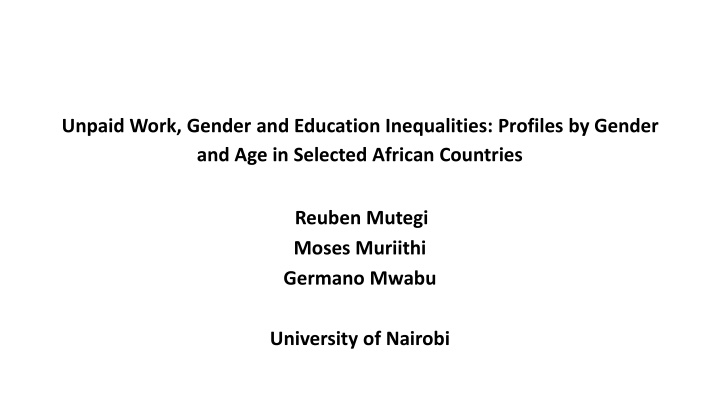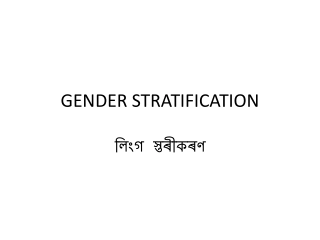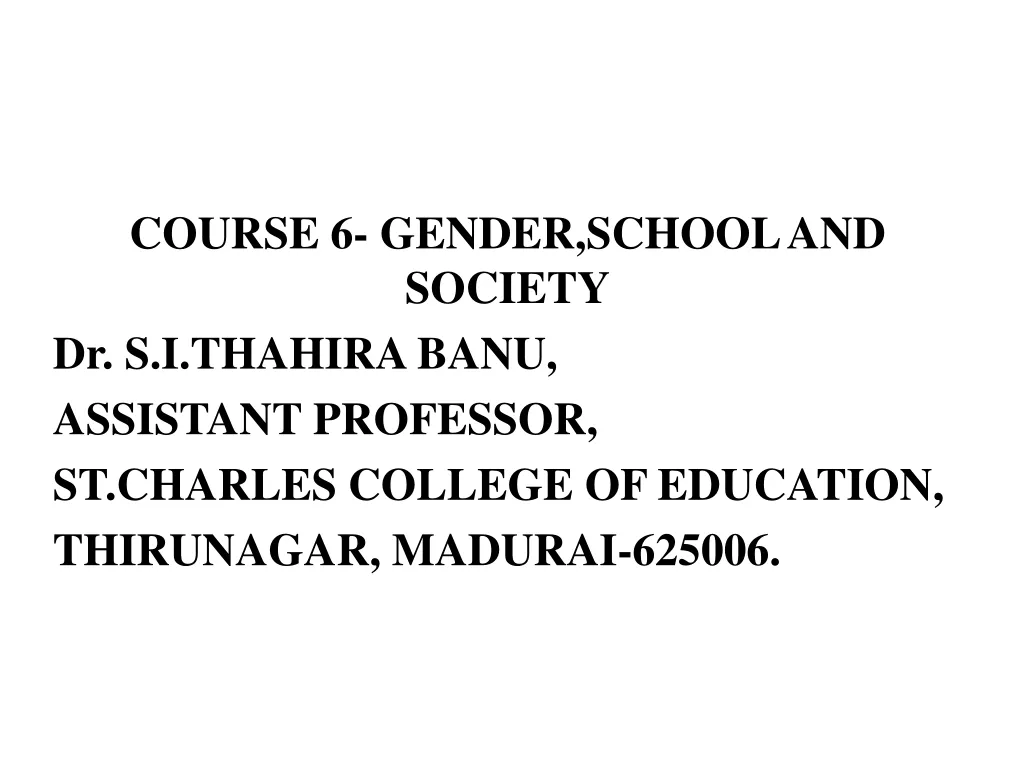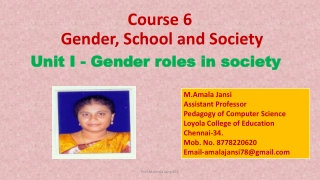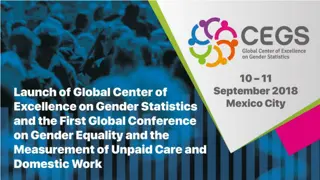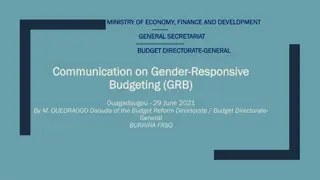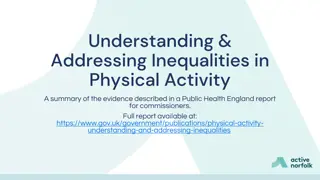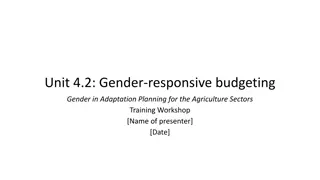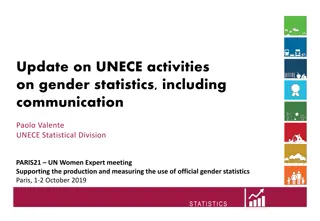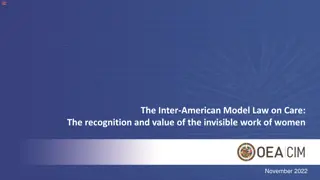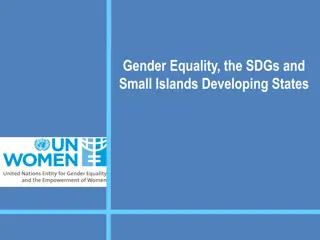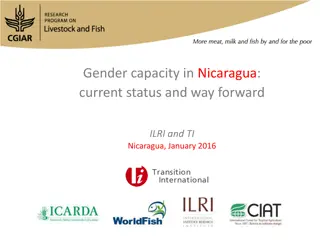Gender and Education Inequalities Due to Unpaid Work in African Countries
This research focuses on the impact of unpaid work on education participation in African countries, specifically analyzing gender and age disparities. It addresses the prevalence of child labour, the influence of unpaid work on schooling, and aims to identify policies that can help close the gender gap in unpaid work. The methodology involves developing time-use and inequality profiles based on time use surveys and estimation of age profiles. Data from Ethiopia, Tanzania, Malawi, and Uganda is utilized to explore unpaid activities like water and firewood collection, highlighting the need to address gender inequalities in education.
Download Presentation

Please find below an Image/Link to download the presentation.
The content on the website is provided AS IS for your information and personal use only. It may not be sold, licensed, or shared on other websites without obtaining consent from the author.If you encounter any issues during the download, it is possible that the publisher has removed the file from their server.
You are allowed to download the files provided on this website for personal or commercial use, subject to the condition that they are used lawfully. All files are the property of their respective owners.
The content on the website is provided AS IS for your information and personal use only. It may not be sold, licensed, or shared on other websites without obtaining consent from the author.
E N D
Presentation Transcript
Unpaid Work, Gender and Education Inequalities: Profiles by Gender and Age in Selected African Countries Reuben Mutegi Moses Muriithi Germano Mwabu University of Nairobi
Cases of unpaid work Children fetching water Children fetching water
Motivation There have been concerns that child labour (paid work) minimizes learner participation in school Consequently, studies were carried out to establish how child labour affects schooling (See Patrinos and Psacharopoulos (1997), Psacharopoulos (1997), Jensen and Skyt Nielsen (1997) and Ray (2000) These studies focused more on child labour (paid work) and ignored unpaid work This paper analyses the inequalities that exist in access to education due to Unpaid Work by gender and age of the learners in Selected African Countries
Research questions Are there statistically significant differences in unpaid workers by gender among African countries? Is unpaid work a source of gender inequality in education participation? What policies can close the gender gap in unpaid work?
Methodology To develop time use and inequality profiles we were guided by Reid (1934) and Donehower (2014) methodology which has the following steps a) Identification of the time use survey b) Identification of the unpaid activities not included in the GDP calculations c) Imputation of monetary value to unpaid work activities d) Estimation of the NTTA age profiles
Data Country Approximate sample size Survey year Ethiopia 4000 2014 Tanzania 3200 2011 Malawi 3200 2013 Uganda 3200 2011 The LSMS is a nationally representative data collected by National Statistics Offices of study countries. The surveys have a time-use section that captures data on the number of hours spent by household members on some unpaid household work. Since data on water and firewood collection was common across all study countries, we focused on the two variables for comparability purpose.
Results Economic activities in Malawi 9 GANYU 0 UNPAID APPRENTICESHIP 61 UNPAID HOUSEHOLD LABOUR (AGRIC) 16 HOUSEHOLD BUSINESS (NON-AG) 14 WAGE EMPLOYMENT EXCLUDING GANYU 0 10 20 30 40 50 60 70
Economic activities by gender (Malawi) 83 90 73 80 63 70 54 60 50 50 46 50 37 40 27 30 17 20 10 0 WAGE HOUSEHOLD BUSINESS (NON-AG) UNPAID HOUSEHOLD LABOUR (AGRIC) UNPAID GANYU EMPLOYMENT EXCLUDING GANYU APPRENTICESHIP male female
Occupation by gender (Tanzania) 35 30 28 30 27 25 25 19 17 20 15 10 10 7 6 6 4 4 4 3 2 5 2 1 1 1 1 0 0 0 0 0 0 0 0 0 0 0 0 0 0 0 Male Female
Hours of water and firewood by Gender and Age; Malawi 3.5 3 NUMBER OF HOURS 2.5 2 1.5 1 0.5 0 0 5 10 15 20 25 30 35 40 45 50 55 60 65 70 75 80 85 90 AGE Male_firewood Female_firewood Male_water Female_water
Hours of water and firewood Ethiopia 2.5 2 NUMBER OF HOURS 1.5 1 0.5 0 0 5 10 15 20 25 30 35 40 45 50 55 60 65 70 75 80 85 90 AGE Male_water Female_water Male_firewood Female_firewood
Hours of firewood and water (Uganda) 7 6 NUMBER IOF HIOURS 5 4 3 2 1 0 0 5 10 15 20 25 30 35 40 45 50 55 60 65 70 75 80 85 90 AGE Male_firewood Female_firewood Female_water Male_water
Hours of water and firewood (Tanzania) 4 3.5 3 NUMBER OF HOURS 2.5 2 1.5 1 0.5 0 0 5 10 15 20 25 30 35 40 45 AGE 50 55 60 65 70 75 80 85 90 Female_firewood Male_firewood Female_water Male_water
Unpaid work as reason for not attending school. 30 26 25 19 20 percentage 15 9 10 5 0 Uganda Malawi Ethiopia
Conclusion This paper reveals a consistent evidence that African women spend much more time than men in search of water and firewood in all the countries studied We find that affordable access to water and firewood is still a nightmare in many African countries in the 21stcentury The findings further indicates that time is spent on water and firewood collection at the expense of schooling, especially among women. We argue that reallocation or release of time spent on household chores for the market and schooling (currently in excess of 30 minutes) would significantly increase the wellbeing of households
